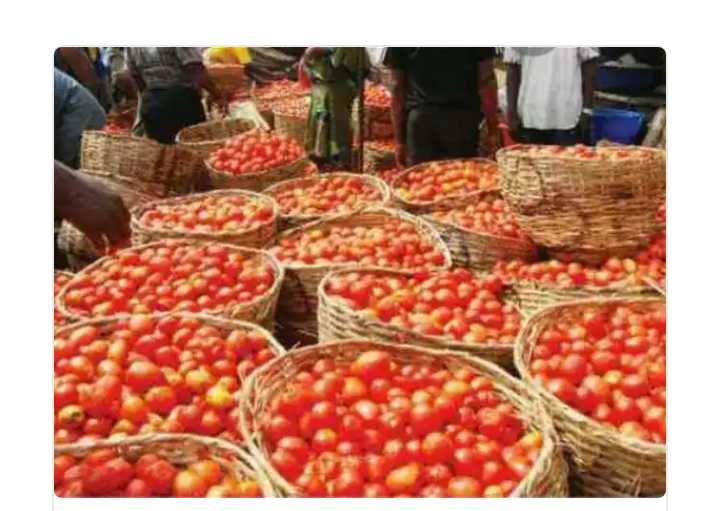Early in the dry season, the country’s tomato growers’ woes were made worse when the ‘Tomato Ebola’ ravaged their farms once more after a seven-year break.
As they typically destroy farms during the dry season, Tuta Absoluta is a family species that is extremely damaging to tomato crops. They can be found in large numbers, and no amount of insecticide spraying will be able to reduce their population. They attack the plant from where they are perched under the leaves, damaging the tomato and rendering it unfit for human eating.
Farmers of the product in the states of Kano, Kaduna, Katsina, Jigawa, and Gombe feel the pinch as they mourn the loss of billions of Naira in investments.
The National Secretary of the National Tomato Growers, Processors and Marketers Association of Nigeria, Sani Danladi, commented on the plight of tomato farmers, saying, “The huge losses by over 500 farmers in Kano are heartbreaking, while we are yet to know how many farmers are affected in Katsina, Jigawa, Kaduna and Gombe States.
“This ‘war’ affects all Nigerians, not just the government and farmers.
“Regardless of how big or small a farm is, Tuta Absoluta kills everything there in three days after entering.
It is extremely damaging because it wipes out all of the farm’s investments. When one hectare of farmland is used to grow tomatoes, the investment is at least N1.7 million.
“Farmers lose a significant sum of money each year whenever this sickness appears.
“Now 90% of Kano’s tomato crop has been destroyed by the Tuta Absoluta devastation because it is different from caterpillars and dangerous to human health; this one is very devastating.”
The disease outbreak that has gradually reduced supply has led to high tomato prices in some markets in Abuja and across the nation.
Sani Danladi, the president of NAPTAN, the National Tomato Growers, Processors and Marketers Association of Nigeria, stated that Tuta Absoluta does not occur early in the season but rather after temperatures reach high levels. For this reason, some farmers are hesitant to plant tomatoes at a later date.
“In Nigeria, tomato is quite inexpensive from January to March, but from April onward, it becomes highly rare since farmers are hesitant to conduct late transplanting. This disease, which this year destroyed more than 300 hectares and affected more than 500 farmers only in Kano State, as well as farmers in Kaduna, Katsina, Jigawa, and Gombe States—and we are still gathering data from the remaining states—has made tomatoes extremely scarce at the moment.
In order to tackle Tuta Absoluta, the Federal Government has partnered with the Nigeria Agribusiness Group (NABG), Sygenta, International Institute of Tropical Agriculture (IITA), Hort Nigeria, Nigerian Horticultural Research Institute (NIHORT), and others.
During a news conference organized by Horti Nigeria and funded by the Netherlands regarding the ravaging insects, they announced their decision.
The NABG President, Emmanuel Ijewere, stated during the press conference that all parties had declared a complete “war” against the insects.
As his organization was planning a stakeholders’ meeting to address the issue, Ijewere emphasized that the worrying development could not be left to the farmers alone because they were the ones who were most affected and not even the processors, given that they had made significant investments in their farms for the purpose of growing tomatoes.
Tuta Absoluta is an insect that has decimated tomato farms, and we have found that it is extremely destructive to tomatoes and quite intelligent.
When the insecticide is applied, it has no effect on the insects since they have chosen to construct their nests under the leaves.
“The most affected states are primarily Kano, Kaduna, Katsina, and Gombe, but the insects can travel to any state as long as the conditions are perfect without a visa.
“Climate change has made it easier for pests to migrate across the field; the warm climate encourages their extensive spread, and increased humidity makes it possible for these pests to thrive, leading to the recent outbreak of Tuta Absoluta.
“We had it for a very long time, and it was quite heartbreaking. Climate change gave us a respite, and now that their environment is more favorable, they are attacking us at a time when our economy is so fragile.
“We appreciate the Federal Ministry of Agriculture and Rural Development’s presence, and we are collaborating to find a solution to this issue.
It comes down to this: “It is ‘war’ we are going to declare against these insects, and all of us here will be providing the ‘weapons’ to achieve it. The biggest sufferers are farmers who are already in trouble, have invested in buying inputs, and it is time to harvest and there is nothing to harvest.
The Federal Ministry of Agriculture and Rural Development’s Director of Horticulture, Dr. Deola Lordbanjoce, added in a statement that “this current crisis with Tuta Absoluta started from a local government in Kano, Galama.”
“When it was reported, we started our investigation, and we discovered that only that local government was affected by this infestation on a scale of about 300 hectares.”We also need to investigate the economics of what we are discussing from our end. Then we learned from economic data that farmers in that local government may have suffered losses of up to N1.3 billion as a result of the Tuta Absoluta infestation.
“We are investigating what is happening in other states in cooperation with the National Tomato Growers, Processors and Marketers Association of Nigeria. We already have our records, and we are working on two things at the same time. The Ministry is calling a meeting of stakeholders, which may be

combined with what the NABG is preparing.
The Ministry is actively seeking funding and interventions to address the major issues with Tuta Absoluta, and we are providing NIHORT with some funding so they may create the hybrid seeds they recently produced and buy some IPM packages to manage Tuta Absoluta.
“Our nation needs about 5.4 million metric tons of tomatoes, but we are unable to meet the 1.3 million metric tons deficit. Now that we have Tuta Absoluta, that means the deficit will increase to 3 million metric tons, which would be a crisis if permitted and would drive up consumer prices, which already are high.
Oladigbolu Abiola, Head, NIHORT Biopesticide Center, spoke on behalf of Dr. Mohammad Attanda, Executive Director and Chief Executive Officer, CEO, NIHORT, who recalled that the pest in 2015 caused enormous damage and disruption to the tomato value chain.
“The sole reliance on synthetic insecticides for the control of Tuta has resulted in development of resistance a change in the sensitivity of Tuta population to synthetic pesticides,” he continued. “This results in the failure of a correct application of the pesticides to control Tuta as is being experienced now, thus escalating outbreaks while the food security of the nation is threatened.”
In the meantime, the head of NIHORT has made the following recommendations: in order to stop this trend, the Federal Ministry of Agriculture and Rural Development should include NIHORT’s sustainable Tuta Integrated Management Package for tomato production in the national tomato policy.
Farmers should also work to adopt the planting of NIHORT’s three recently released tomato seeds, which have been bred for high yield, fusarium tolerance, good shelf life, and nutritional qualities. The destruction caused by Tuta Absoluta reached epidemic proportions in 2016 and 2017, however NABG and its allies gave some remedies, according to the Director General, DG, NABG, Dr. Manzo Maigari.
Tuta Absoluta has returned today, and Maigari urged all of the important players to get together and reach a consensus on the best course of action.
Because the Tuta Absoluta have so far shown resilience in the clusters they have managed, we have also witnessed the entry of a new stakeholder, Horti Nigeria, backed by the Dutch government. They have a regime of methods that have proven advantageous to farmers.
So that the whole thing has an integrated approach, this adds to the bouquet of solutions we want to offer farmers.
Horti Nigeria’s Mohammed Idris, the program director, stated, “We will work with farmers and agro-dealers, showing techniques and technologies needed to combat this all but disastrous pest.”











Leave a Comment